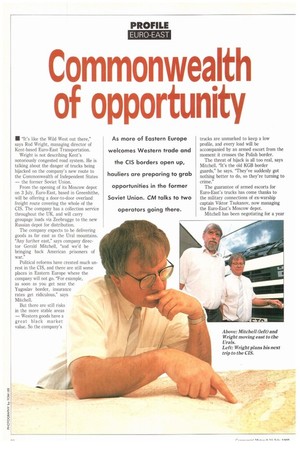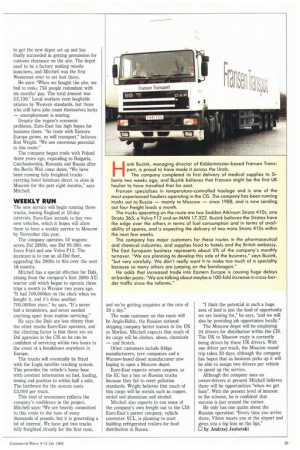Commonwealth of opportunity
Page 30

Page 31

If you've noticed an error in this article please click here to report it so we can fix it.
• "It's like the Wild West out there," says Rod Wright, managing director of Kent-based Euro-East Transportation.
Wright is not describing Kent's notoriously congested road system. He is talking about the danger of trucks being hijacked on the company's new route to the Commonwealth of Independent States — the former Soviet Union.
From the opening of its Moscow depot on 3 July, Euro-East, based in Greenhithe, will be offering a door-to-door overland freight route covering the whole of the CIS. The company has a collection service throughout the UK, and will carry groupage loads via Zeebrugge to the new Russian depot for distribution.
The company expects to be delivering goods as far east as the Ural mountains. "Any further east," says company director Gerald Mitchell, "and we'd be bringing back American prisoners of war."
Political reforms have created much unrest in the CIS, and there are still some places in Eastern Europe where the company will not go. "For example, as soon as you get near the Yugoslav border, insurance rates get ridiculous," says Mitchell.
But there are still risks in the more stable areas — Western goods have a great black market value. So the company's to get the new depot set up and has finally succeeded in getting permission for customs clearance on the site. The depot used to be a factory making missile launchers, and Mitchell was the first Westerner ever to set foot there.
He says: "When we bought the site, we had to make 750 people redundant with six months' pay. The total amount was £2,100." Local workers earn laughable salaries by Western standards, but those who still have jobs count themselves lucky — unemployment is soaring.
Despite the region's economic problems, Euro-East has high hopes for business there. "As trade with Eastern Europe grows, so will transport," believes Rod Wright. "We see enormous potential in this route."
The company began trade with Poland three years ago, expanding to Bulgaria, Czechoslovakia, Romania and Russia after the Berlin Wall came down, "We have been running fully freighted trucks carrying hotel furniture direct to sites in Moscow for the past eight months," says Mitchell.
WEEKLY RUN
The new service will begin running three trucks, leaving England at 10-day intervals. Euro-East intends to buy two new vehicles, which it hopes will allow them to have a weekly service to Moscow by November this year.
The company operates 10 wagons: seven Oaf 2800s, one Daf 95-360, one Iveco Ford and one Volvo F12. The intention is to run an all-Daf fleet, upgrading the 2800s to 95s over the next 18 months.
Mitchell has a special affection for Oafs, arising from the company's first 2800 ATi tractor unit which began to operate three trips a month to Warsaw two years ago. "It had 700,000km on the clock when we bought it, and it's done another 700,0001on since," he says. "It's never had a breakdown, and never needed anything apart from routine servicing."
He says the Dafs are less thirsty than the other trucks Euro-East operates, and the clinching factor is that there are six Oaf agencies in the CIS so he can be confident of servicing within two hours in the event of a breakdown anywhere in Europe.
The trucks will eventually be fitted with the Logiq satellite tracking system. This provides the vehicle's home base with constant information on fuel, loading, timing and position to within half a mile. The hardware for the system costs £3,000 per truck.
This kind of investment reflects the company's confidence in the project. Mitchell says: "We are heavily committed to this route to the tune of many thousands of pounds, but it is generating a lot of interest. We have got two trucks fully freighted already for the first runs, and we're getting enquiries at the rate of 20 a day."
The main customer on this route will be Anglo-Baltic, the Russian national shipping company better known in the UK as Morline. Mitchell expects that much of its cargo will be clothes, shoes, chemicals — and Scotch.
Other customers include fridge manufacturers, tyre companies and a Warsaw-based diesel manufacturer now hoping to open a Moscow depot.
Euro-East expects return cargoes, as the EC has a ban on Russian trucks because they fail to meet pollution standards. Wright believes that much of this cargo will be metals such as copper, nickel and aluminium and alcohol.
Mitchell also expects to run some of the company's own freight out to the CIS: Euro-East's parent company, vehicle converter YCL, is planning to start building refrigerated trailers for food distribution in Russia. "I think the potential in such a huge area of land is just the kind of opportunity we are looking for," he says, "and we will also be providing job opportunies
The Moscow depot will be employing 24 drivers for distribution within the CIS. The UK to Moscow route is currently being driven by three UK drivers. With one driver per truck, the Moscow round trip takes 20 days, although the company has hopes that as business picks up it will be able to assign two drivers per vehicle to speed up the service.
Although the company uses no owner-drivers at present Mitchell believes there will be opportunities 'when we get busy". With the present level of interest in the scheme, he is confident that success is just around the corner.
He only has one qualm about the Russian operation: "Every time you arrive there, Viktor meets you at the airport and gives you a big kiss on the lips."
0 by Andrzej Jeziorski












































































